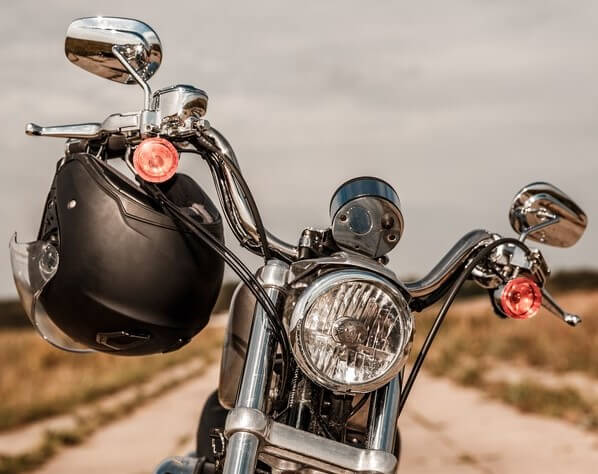
Motorcycles are fun, but inherently dangerous. They are less visible to others on the roads and if there is an accident, those riding a motorcycle don’t have the protection of metal and steel around them like people in a car. Therefore, any protection a motorcycle rider can use will lessen the chances of a serious or fatal injury. A helmet is a good place to start. Besides the physical protection motorcyclists can employ to protect themselves, making sure you have good motorcycle insurance will also help cover you in the event of an accident.
Millions of people enjoy riding motorcycles. Some take their bikes out occasionally, others belong to a group that rides every weekend, and a small number of riders depend on their motorcycles for transportation to and from work. And they all should wear a motorcycle helmet.
How Many People are Killed Due to Not Wearing a Helmet on a Motorcycle?
According to this motorcycle injury lawyer, riding without a helmet increases your risk of death by 37 percent in an accident. In 2020, more than 5,500 motorcyclists were killed in accidents. About 40 percent of those were not wearing a helmet.
And, if you survive a bad crash on your motorcycle, the odds of having to live the rest of your life with a traumatic brain injury or serious lifelong complications go up when you don’t wear a helmet. It makes sense to consider wearing various protective gear – and especially a helmet – every time you climb on your bike. And in some states, it’s the law.
What States Require a Motorcycle Helmet?
It depends on the state you live in and, in some cases, other factors, such as your age. Let’s take a closer look at the various state laws.
| State | Helmet Law |
| Alabama | Helmet required for all riders |
| Alaska | Helmet required for 17 and younger |
| Arizona | Helmet required for 17 and younger |
| Arkansas | Helmet required for 20 and younger |
| California | Helmet required for all riders |
| Colorado | Helmet required for 17 and younger |
| Connecticut | Helmet required for 17 and younger |
| Delaware | Helmet required for 18 and younger |
| District of Columbia | Helmet required for all riders |
| Florida | Helmet required for 20 and younger |
| Georgia | Helmet required for all riders |
| Hawaii | Helmet required for 17 and younger |
| Idaho | Helmet required for 17 and younger |
| Illinois | No helmet law |
| Indiana | Helmet required for 17 and younger |
| Iowa | No helmet law |
| Kansas | Helmet required for 17 and younger |
| Kentucky | Helmet required for 20 and younger |
| Louisiana | Helmet required for all riders |
| Maine | Helmet required for 17 and younger |
| Maryland | Helmet required for all riders |
| Massachusetts | Helmet required for all riders |
| Michigan | Helmet required for 20 and younger |
| Minnesota | Helmet required for 17 and younger |
| Mississippi | Helmet required for all riders |
| Missouri | Helmet required for 25 and younger |
| Montana | Helmet required for 17 and younger |
| Nebraska | Helmet required for all riders |
| Nevada | Helmet required for all riders |
| New Hampshire | No helmet law |
| New Jersey | Helmet required for all riders |
| New Mexico | Helmet required for 17 and younger |
| New York | Helmet required for all riders |
| North Carolina | Helmet required for all riders |
| North Dakota | Helmet required for 17 and younger |
| Ohio | Helmet required for 17 and younger |
| Oklahoma | Helmet required for 17 and younger |
| Oregon | Helmet required for all riders |
| Pennsylvania | Helmet required for 20 and younger |
| Rhode Island | Helmet required for 20 and younger |
| South Carolina | Helmet required for 20 and younger |
| South Dakota | Helmet required for 17 and younger |
| Tennessee | Helmet required for all riders |
| Texas | Helmet required for 20 and younger |
| Utah | Helmet required for 20 and younger |
| Vermont | Helmet required for all riders |
| Virginia | Helmet required for all riders |
| Washington | Helmet required for all riders |
| West Virginia | Helmet required for all riders |
| Wisconsin | Helmet required for 17 and younger |
| Wyoming | Helmet required for 17 and younger |
Why Does the State Care if I Wear a Helmet on My Motorcycle?
Mainly because of the huge economic toll motorcycle accidents take on the government. Of course, your state lawmakers also care about the suffering and long-term disabilities of those who survive a bad motorcycle crash. But in the long run, the CDC estimates the U.S. could save $1.5 billion if all motorcyclists wore a helmet. Your motorcycle insurance is only going to go so far when you have sustained a catastrophic head injury in a motorcycle wreck.

What is the Best Motorcycle Helmet?
Today, motorcycle helmets run the gamut and picking one can be confusing. Most helmets for sale are subject to strict safety guidelines. As long as you purchase your motorcycle helmet from a reputable dealer, you should be fine.
Whether you choose an open-face, modular, half, dual-sport, off-road, full-face, or some other design, there’s something for everyone. The best motorcycle helmet for you is dependent on what kind of riding you will be doing. Those who plan to cruise on city roads and highways will need a different sort of helmet than those who plan to do some off-roading.
The main thing is to be sure your helmet fits. With such a wide variety of helmets available, don’t buy one unless it feels snug and comfortable. Your helmet (or brain bucket in motorcycle parlance) is too important to skimp on, so be sure and get the best you can afford.
You should consider other protective riding gear – for both you and your bike – as well.
The Right Gear for Your Motorcycle Can Save You Money on Insurance
The better protected you and your passengers are, the less chance you’ll be seriously injured if you have to lay your bike down. That’s why it’s advised to wear boots and protective clothing, such as leather chaps and leather coat.
When it comes to your motorcycle itself, the following are some of the things you should consider adding to an existing bike or when buying a new one. These motorcycle protections could save you money on your motorcycle policy.
- Antilock Brakes – Like cars and trucks, a lot of motorcycles come with anti-lock brakes. These allow the rider to brake faster. As a result, they remain in control, thereby avoiding motorcycle accidents.
- Air Bags – Did you know you may now select a bike with airbags? Typically, the manufacturer installs these just behind the windscreen. An alternative is to select high-tech riding gear with built-in airbags. That includes full-body suits, leather jackets, and motorcycle helmets.
- Bike Design – Sure, you want a bike that looks great on the road, but at the same time, you want a safe one. Those with a wider or longer frame offer better control and traction. The size and weight of the bike are additional factors. However, always make sure you purchase a motorcycle that best suits your skill level and strength.
- Anti-theft System – A lot of insurance companies also give discounted rates for motorcycles designed with anti-theft systems.
- Lights – Even certain motorcycle accessories play a role in what you pay for insurance protection. You obviously want lights that enhance your visibility, but those with reflective qualities make it easier for other people on the road to see you.
Find Cheap Motorcycle Insurance Online Today
If you’re looking for excellent insurance that you can afford, it starts with the type of bike you buy and the riding gear you wear. Even in states that don’t require motorcycle helmets, people who wear them not only reduce their risk of serious injury or worse in the event of motorcycle accidents, they also spend less on insurance coverage.
At Freeway Insurance we are experts at finding the best motorcycle insurance rates for your needs and budget. Get a free motorcycle insurance quote online, over the phone at (800) 777-5620 or at one of our offices near you.


